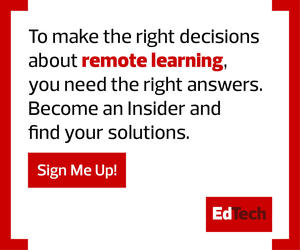Brian Cockrell, the co-founder and product owner of the Intel Unite collaboration solution, noted the importance of building solutions that can work flexibly across environments and settings.
“Education technologies are here with solutions that will take us into the next revolution of how we teach, learn, connect and succeed,” he said in a session Wednesday at the 2021 Future of Education Technology Conference.
Cockrell said that though schools aren’t able to make the same dramatic shifts as remote-oriented companies, there is lots of room to continue to innovate education technology in school settings — even as the settings themselves shift. He said he experienced this personally when he found himself hamstrung by a poorly integrated cloud experience when he helped his daughter shoot a video for class.
“Little did I know it would take me an hour to finally get the video uploaded to where it needed to go,” he said. “No, it wasn’t because we professionally edited it; it was because of the lack of integration of tools.”
He emphasized the need for infrastructure to manage the experiences of students and educators in a variety of settings. Perhaps an educator suddenly needs to move a lesson to another part of the campus to make room for social distancing, or an administrator needs access to a digital whiteboard. He challenged school districts to ask more of their vendors in building these technologies out.
“Meet your needs and the needs of your people, now and into the future,” Cockrell said during his Wednesday session. “Advocate for your schools by demanding your vendors provide and unite to create solutions that can usher in the next revolution of education.”
Whiteboard Technology That Adapts
Of course, it helps when the technology is already being built with flexibility in mind.
Promethean, a maker of digital whiteboards, projectors and other classroom display tools, has helped schools adapt to remote learning by making updates to its equipment to accommodate remote and hybrid classroom settings, including making it possible for teachers to record and share lessons on the fly.
While its technology was not designed with the recent massive shift in learning environments in mind, it has nonetheless proved an effective tool for many school districts making the leap, said Leslie Lowe, the company’s regional vice president of sales.
“We moved, literally over a weekend, from a physical to a strictly digital space,” Lowe stated during the session.
Lowe noted during the Thursday session that the whiteboard technology, which offers features such as easy screen sharing with students, helps to bring back some of the interactivity that might be lost in a remote or hybrid setting. It features instant polling and real-time feedback through screen-sharing software.
“I can also use the same types of tools to increase levels of rigor, ask students to respond to one another and expand upon ideas,” Lowe added.
The technology can also allow teachers to create educational offerings in asynchronous environments to enable students to learn at different times. One popular feature the company recently added to its software is the ability to record lessons and save them in the industry-standard MP4 format, allowing lessons to be downloaded on demand.
The company says it is continuing to make strides to build innovative, interactive experiences with easy-to-use cross-platform capabilities and strong security. Lowe said that even with the dramatic shifts of 2020, it was a good year for education technology.
“What have we learned through this experience? Teachers and students are resilient and able to quickly adapt curriculum and content to various platforms,” Lowe said.
EdTech is covering FETC, so bookmark this page for conference coverage. Follow @EdTech_K12 on Twitter for live updates, and join the conversation using the #FETC hashtag.











